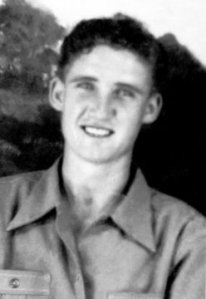19/365 – Honoring – Carl Hyde
Born atop the Ryo Mountain Ridge in Gordon County, GA, Conyers resident Carl Hyde was 2 years old when his farming family moved to Atlanta. “My father and brother went into business,” Hyde said. “But when dad passed away we ended up farming again in Jackson and Morgan Counties.” A graduate of Morgan County High School, Hyde and all 5 of his brothers were drafted during WWII. The oldest Hyde boy lost his life during the Battle of the Bulge.
“I was only 16 when the war started,” Hyde said. “So after high school I moved to Savannah to attend vocational school.” Working as a soda jerk in a local drug store to augment expenses, Hyde mastered airplane mechanics and eventually earned $128.00 per week. “Shoot, that was fantastic money back then,” he said. A good son, Hyde paid his mother’s debts before joining his siblings in uniform. “I talked mom into signing papers as soon as I turned 17,” he said.
Carl Hyde chose the United States Marines. He said, “I remember my first day at Parris Island, standing there in formation wondering ‘what the heck have I gotten myself into’?” After qualifying as a sharpshooter, Hyde received laid-back barracks duty while the rest of his platoon pulled mess duty. “Sharpshootin’ wasn’t hard for an ole’ Georgia farm boy like me,” he said with a smile. “After graduating from basic training, Sergeant Lathrop, our drill instructor, teased us, ‘You young’uns will be gettin’ your butts shot off while I’m sittin’ here drinkin’ beer!’ We’d get him back for that one.”
Sent home for a 10 day leave, Hyde eventually traveled via train to San Diego to board a troop ship with the 3rd Marine Division. Destination: retake the island of Guam.
“I had special weapons training,” Hyde said. “I drove an open-top half-track with 4 gunners on each corner manning 50 caliber machine guns, but we found out on Guam an open-top wasn’t beneficial on safety. The Japs lobbed hand grenades in, and we threw them back out. That’s sort of risky.”
Their half-track would be called into service to wipe out enemy fighting positions, normally pillboxes armed with machine guns or heavy weapons. Moving back after one engagement, Hyde got the surprise of his life. “Here comes my ole’ drill instructor, Sgt. Lathrop, marching into battle,” Hyde recalled, grinning. “I screamed at him, Hey, Sarge, while you’re up there gettin’ your butt shot off I’ll be back here drinkin’ beer! Payback is hell, they say.”
That night as Hyde backed the half-track into a protective cover of jungle growth, he felt a series of bumps under the treads. Not thinking anything of it, plus under orders not to move the half-track after dusk, Hyde and crew settled into a meal of K-rations and a little shut-eye. “An appalling smell awoke us,” he said. They’d backed over 7 dead Jap soldiers, obviously left in the jungle by their comrades. Guam was considered “secured” after 5 days of desperate fighting.
The Marines of the 3rd Division were told their next destination would be easy, no more than a 3 day push, and they may not be needed at all, on a rocky black sand Pacific island called Iwo Jima. “We were supposed to land on D-Day plus 3,” Hyde said. “Well, we were on that meat-grinder the 2nd day. My, God, what we saw, what we witnessed. I still have trouble talking about it.”
On Iwo Jima, Hyde and crew had a full-tracked 105mm howitzer, still manned by the same 5 guys. They fought across Iwo Jima for 31 straight days of combat. “We’d be called up, take out a pillbox, blast a rock formation or tunnel, then pull back. At night we tried to sleep. I don’t remember sleeping, and what I do remember about Iwo Jima I’ve tried to forget.”
Hyde and crew witnessed the famous flag-raising on Mount Suribachi. “After all the blood-letting on that island, ole’ Glory suddenly appeared fluttering in the wind atop Mount Suribachi. Good lord, you should have heard all the ship horns and hollering that went on in celebration.” Pausing, Hyde said softly, “I’ve seen the American flag burned on TV by our own citizens. If they’d been on Iwo Jima, well, they would understand the cost of that so-called free speech.”
Battle-weary and battle-hardened, the 3rd Marine Division sailed back to Guam to prepare for the up-coming invasion of Japan. “Those two atomic bombs saved us,” Hyde said. “Some people want to apologize for that. Are you kidding me? The war needed to end; the suffering and dying had to stop. We did the right thing.”
Instead of home, Hyde was shipped to China. “We were still needed in case the peace didn’t hold,” he said. “We were posted at a dinky outpost, but could at least go to a nearby town for food and drink.” Several times while walking into town the marines got caught between firefights of the Nationalist and Communist Chinese. Hyde recalled, “As soon as they saw we were Americans, they stopped the battle. We’d walk by; then they’d start killing each other again. A little crazy, I know, but so is war.”
All but one of the Hyde boys made it home. Carl Hyde eventually retired from 31 years with the GM Company in Doraville. His words of wisdom: “Every kid when they turn 18 should go through Parris Island, whether they serve or not. The country would be 100% better!”
Pete Mecca – http://www.aveteransstory@gmail.com
Pete Mecca – Vietnam veteran, columnist, and free-lance writer
If you’d like to be considered for one of my featured newspapers articles
entitled “A Veteran’s Story” email me at: aveteransstory@gmail.com
You can review my articles at: rockdalecitizen.com or newtoncitizen.com
Click on ‘community’ then click on ‘military news’
Related articles
- Looking Back At Iconic Iwo Jima (npr.org)
- From Our Files: Iwo Jima, Feb. 23, 1945 (csmonitor.com)
- Gunny G’s Marines History and Traditions: Patriotic Fervor and the Truth About Iwo Jima…By Karal Ann Marling and John Wetenhal (gunnyg.wordpress.com)
- One of the First Black Marines Recalls Iwo Jima (theroot.com)
- This Day in History: Marines Raise Flag on Mt. Suribachi (history.icanhascheezburger.com)
- “Uncommon Valor: The Battle of Iwo Jima” Coming to Mesa Public Library (ladailypost.com)
- Gunny G’s….The Flag Raisings – Lest We Forget! (gunnyg.wordpress.com)









Great story. These veterans of WWII never cease to amaze me!
Claudia
http://http://yourmilitarystory.com